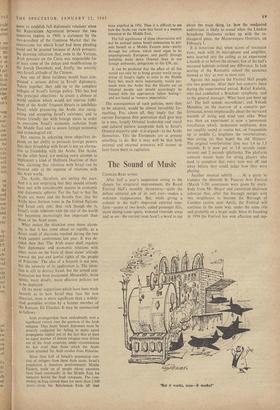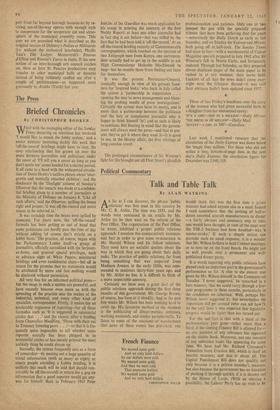The Sound of Music
CHARLES REID writes:
After half a year's suspension owing to the closure for structural improvement, the Royal Festival Hall's monthly throwaway—quite the deftest editorial job of its sort ever—makes a welcome reappearance. But, while giving a column to the hall's improved external com- forts—access at two levels, added passenger lifts, more dining-room space, widened riverside areas and so on—the current issue hasn't a word to say
about the main thing, i.e. how the readjusted auditorium is likely to sound when the London Symphony Orchestra strikes up with the re- inaugural piece, the Mastersingers Overture, on February 1.
It is notorious that when scores of resonator vases, each with its microphone and amplifier, were inserted into the ceiling as an experiment a month or so before the closure, few of the hall's seasoned habitués noticed any difference. In lush scoring of the Romantic school the acoustics seemed as 'dry' as ever to most ears.
Against this negative the Festival Hall people cite two positives. After their last concerts there during the experimental period, Rafael Kubelik, who had conducted a Bruckner symphony, said to the general manager, 'What have you been up to? The hall sounds marvellous'; and Yehudi Menuhin, on the morrow of a concerto per- formance, wrote emphatically about the increased warmth of 'string and wind tone alike. What was then an experiment is now a permanent installation which, spokesmen emphasise, does not amplify sound at source but, on frequencies up to middle C, lengthens the reverberations, thus curing (as they hope) the old 'dryness.' The original reverberation time was 1.4 to 1.5 seconds. It is now put at 1.8 seconds (audi- torium) and 2 seconds (platform). The platform estimate means hope for string players who used to complain that every note was off and away before they could judge how they were playing.
Another musical rebirth . . . At a party to trumpet the eleventh St. Pancras Arts Festival (March A-26) assurances were given by every- body from Mr. Mayor and committee chairmen sideways that, after this borough merges with two neighbours to become the Borough of Camden (active next April), the Festival will continue in the same way, under the same title and probably on a larger scale. Since its founding in 1954 the Festival has won affection and sup- 'Rut it works, man—It works!'
port from far beyond borough boundaries by re- viving out-of-the-way operas with enough style to compensate for the unoperatic cut and atmo- sphere of the municipal assembly room. This year we arc promised what is described as the original version of Debussy's Pellet's et Melisande (i.e. without the orchestral interludes), Phyllis Tate's The Lodger, Monteverdi's Ritorno d'Ulisse and Rossini's Turco in Italia. If the new notion of an inter-borough arts council catches on, these or later St. Pancras productions may transfer to other municipal halls or theatres instead of being ruthlessly snuffed out after a couple of performances—as happened most grievously to Aroldo (Verdi) last year.







































 Previous page
Previous page